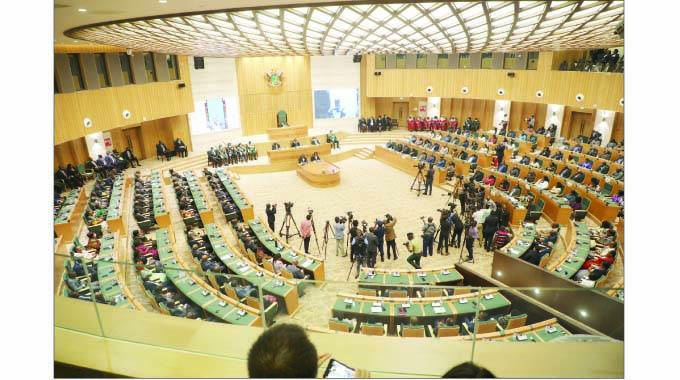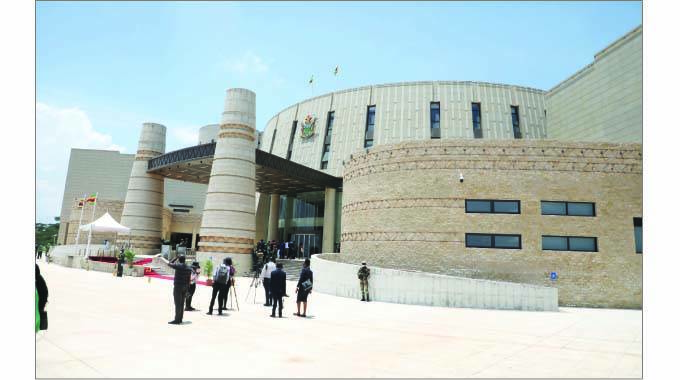The Chronicle

Nqobile Tshili, Chronicle Reporter
GOVERNMENT’s tight monetary and fiscal policy measures to stabilise the economy while curtailing speculative behaviour are bearing fruit while socio-economic growth is being recorded across sectors, President Mnangagwa said yesterday.
He said this in the State of the Nation Address (SONA) while officially opening the fifth session of the Ninth Parliament of Zimbabwe at the new Parliament Building in Mt Hampden, Mashonaland West province.
It was the first business to be conducted at the new building, marking the opening of the last session of Parliament before the 2023 harmonised elections.
The proceedings started at 12PM with the President inspecting the guard of honour.
President Mnangagwa said Government’s policies have slowed down inflation and created an enabling environment for accelerating the implementation of the National Development Strategy 1 (NDS-1).
The economic blueprint which runs until the end of 2025 is foundational towards achieving an upper middle-income economy by 2030.
President Mnangagwa said manufacturing sector industrial capacity utilisation exceeded 66 percent this year compared to 47 percent recorded in 2020.
 SONA complete house
SONA complete houseHe said the local content strategy has seen the introduction of new products that are critical in the agriculture, mining and transport sectors.
“Tight monetary and fiscal policy measures to stabilise the economy, and curtail speculative borrowing and other rent-seeking behaviour, are bearing fruit. Gold coins valued at ZW$9,5 billion were sold as at 30th September, 2022. Smaller denominations of the gold coins have been unveiled by the Reserve Bank of Zimbabwe to broaden access and inclusivity. Every Zimbabwean must jealously guard this stability,” said President Mnangagwa.
He said month-on-month inflation which stood at 12,4 percent in August dropped to 3,5 percent in September.
President Mnangagwa said by August, the country’s foreign currency earnings had increased by 32 percent compared to the same period last year.
He said the country received US$7,7 billion in foreign currency by August this year compared to US$5,8 billion recorded during the same period last year.
President Mnangagwa said of concern is that economic growth outweighs power generation, hence refurbishment of Hwange Unit 7 and 8 is expected to partly address the problem.
“The economy is growing faster than power supply. The Hwange Unit 7 is expected to be commissioned by year end. A further 300 MW from Unit 8 is expected to come on-stream by the second quarter of 2023. Efforts are on-going to expand the country’s energy mix, with focus on renewable energy,” said President Mnangagwa.
The President said modern and efficient infrastructure is the cornerstone for economic development that is why Government has made strides in improving the road network.
President Mnangagwa said more than 340KM of the Harare-Beitbridge highway has been completed and opened to traffic. “Construction of the Mbudzi Interchange is also well underway.
Local companies contracted on the Emergency Road Rehabilitation Programme have created both direct and indirect jobs. Considerable progress has been made on airstrips such as Binga and Bumi Hills, while the upgrading and modernisation of the Robert Gabriel Mugabe International Airport is on schedule. Phase One of the Beitbridge Border Post Modernisation Project is complete and now open to the public,” said President Mnangagwa.
He said housing delivery is expected to spur the nation towards the attainment of Vision 2030 as several projects are being implemented across the country, some funded by the private sector and financial institutions.
The President said notable achievements have been observed in the provision of social protection nets for vulnerable citizens.
He said Government has paid school fees for 2 million orphans and vulnerable children under the Basic Education Assistance Model (BEAM).
President Mnangagwa said Government is providing food to food insecure citizens under the Food Deficit Mitigation Programme.
 SONA building
SONA buildingHe said the launch of the Zimbabwe first satellite into space ZimSat-1 will have far-reaching impacts in the agriculture and mining sectors as well as weather and land management systems.
The President said the education sector should drive the country’s economy through knowledge.
“The Competence-Based Curriculum in primary and secondary schools supports the transition from school to the world of work through study of sciences, technology, innovation and the production of goods and services,” said President Mnangagwa.
“Our education revolution dubbed ‘Chimurenga Chepfungwa’ is progressing at an accelerated pace. Robust innovation and industrialisation ecosystems now characterise our universities and colleges with more and more of our young talented boys and girls registering patents, start-ups and breakthrough inventions.”
President Mnangagwa said innovations will be commercialised as the country pursues modernisation and industrialisation of the country.
He said to improve access to health care, Government is constructing clinics and district hospitals while renovating existing ones.
The President said new medical schools have been established which will promote research in the health sector.
“The new Pathology and Diagnostic Centre at Midlands State University, with state-of-the-art equipment has increased community access to related services. The Simon Mazorodze School of Medical and Health Sciences has been established as part of a comprehensive programme to enhance the training of
Medical Practitioners in the country,” said the President.
The country now has four medical and health sciences schools at tertiary institutions: the National University of Science and Technology, University of Zimbabwe, Great Zimbabwe University and Midlands State University.
He said Government established the Tertiary Education Council to manage polytechnics, teachers’ colleges and industrial training for enhanced national development through learning of science, technology, engineering and innovation to produce goods and services that will improve the citizens’ lives. – @nqotshili
Article Source: The Chronicle
